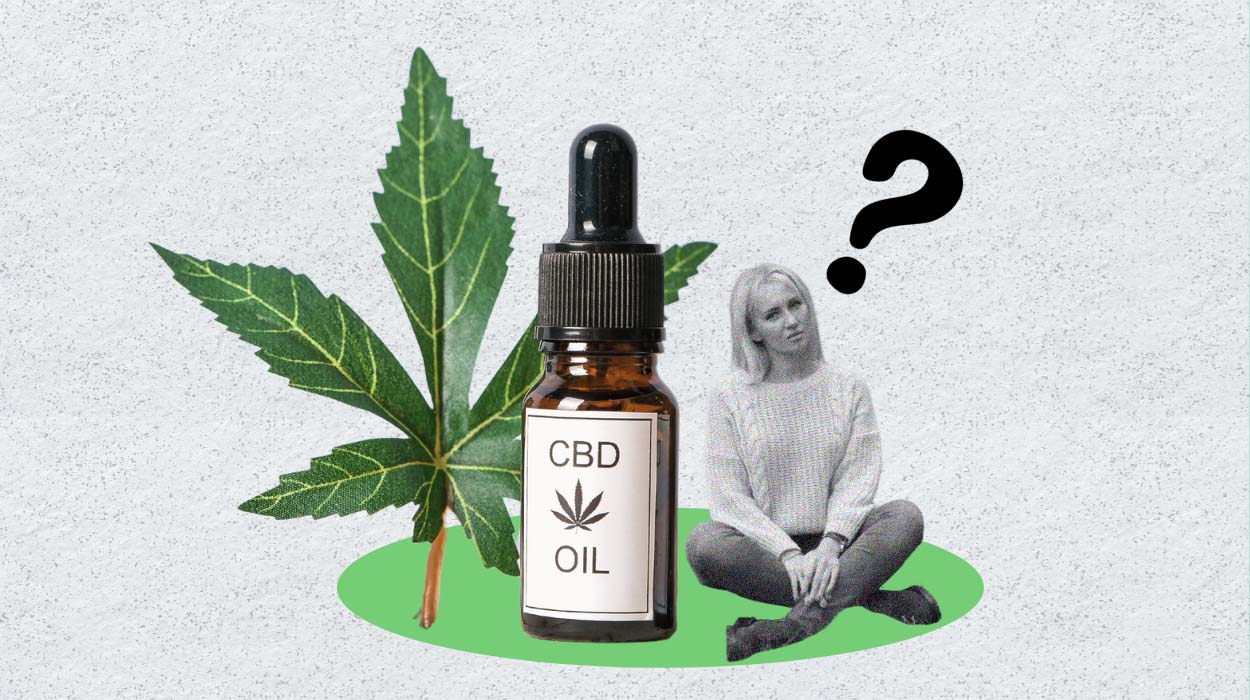 Expert's opinion
Expert's opinion
Expert's opinion
The article is a subjective view on this topic written by writers specializing in medical writing.
It may reflect on a personal journey surrounding struggles with an illness or medical condition, involve product comparisons, diet considerations, or other health-related opinions.
Although the view is entirely that of the writer, it is based on academic experiences and scientific research they have conducted; it is fact-checked by a team of degreed medical experts, and validated by sources attached to the article.
The numbers in parenthesis (1,2,3) will take you to clickable links to related scientific papers.
CBD Doesn’t Work For You 2024: 5 Reasons Why CBD Is Not Working

Before you declare Cannabidiol (CBD) a scam and cut all ties with the product, you might want to find out why it is not working for you.
CBD is the non-psychoactive component of cannabis[1] that has increased in popularity in recent years. Some people use CBD to relieve nerve pain, anxiety, inflammation, insomnia, and sore muscles.
Many people report positive results for medical conditions such as chronic pain from CBD use, so, why is not it working for you?
Let us jump right in.
5 Reasons Why CBD Is Not Working For You
- You are using a low-quality product
- You are taking the wrong dose
- It might not be for you
- You might need some time
- You might need a different delivery method
Why CBD Doesn’t Work For You
CBD and THC were both cannabinoids from the cannabis plant. However, unlike Tetrahydrocannabinol (THC), CBD is not psychoactive.
Many users find CBD to be helpful for their medical conditions. So, despite the hype, you have tried CBD and you do not seem to be getting any results.
Several factors affect how soon you will see results from CBD use on your health. These factors depend on the product quality, type, and your body’s metabolism.
Your body responds to CBD use through the endocannabinoid system. Your body produces cannabinoids that also work through this system.
However, there is still much to be uncovered about the endocannabinoid system and how it operates.
These points could help you find out why you are not getting results from CBD use and could help you make adjustments.
You Are Using A Low-Quality Product
The quality of your CBD affects its effectiveness. A study[2] conducted found that only a fraction of available CBD products on the market contain the stated concentration of CBD.
That means that you could be taking far less than you need to be taking to see results.
With hundreds of CBD brands on the market choosing the right product for you can be a challenge. Ensuring that the brand you choose is of optimal quality further compounds the problem.
Some poor-quality brands might contain fillers that offer no value to the product.
One way to ensure that you are getting CBD of higher quality is to go for products that have been independently tested.
These independent tests help confirm the concentration and quality of CBD you are buying.
You can also look out for reputable CBD brands in the market to purchase from. Avoid shady sellers online and request lab results if you are unsure.
Reading up on customer reviews is also a great way to ensure that you are getting top-quality CBD. The more people who have had a positive experience with the product, the more likely that you will too.
The type of CBD product you are using could also be affecting your results. CBD could be broad-spectrum, full-spectrum, or isolate.
Full-spectrum products contain THC at detectable levels and some people only get results from this type of CBD product. If you are yet to see results from CBD use consider going full spectrum.
You Are Taking The Wrong Dose
When it comes to taking CBD, there is no ideal dose for everyone. So, you might have to work out how much CBD you should take on your own till you strike a balance.
Many first-timers would feel comfortable starting with a lower CBD dose. You will need to monitor how your body responds to low doses between 10-50mg per day.
If you do not seem to be getting any effects at such a low dosage, consider going up a bit.
Finding your optimal CBD dose might require some trial and error. Consider increasing your dosage after about a week at your current dose. Weekly increases in your dosage should help you find your sweet spot.
You Might Need More Time
Some people are lucky enough to feel the effects of CBD use almost immediately.
If you are not one of such people, it is okay and you will need to be patient.
You might want to consider that you might not have given your CBD oil enough time to work on your endocannabinoid system[3], a regulatory system.
CBD binds to the cannabinoid receptors of your endocannabinoid system to bring you its effects.
However, the endocannabinoid system might not be active enough in some individuals to produce the effects right away.
With the buzz around CBD oil use, it is not unusual for first-timers to expect to feel something from the first use. Some first-timers expect to feel a buzz from using CBD oil.
First, the idea that you will feel a buzz from taking CBD is entirely false. CBD does not have psychoactive properties therefore, you will not be getting a high from using it.
Secondly, for CBD to be effective for some individuals, you might need to commit to its use. Using your CBD oil for a few weeks to a couple of months should help you build that relationship and activate your endocannabinoid system further to help you see results.
You might also need to supplement your topical CBD products with CBD oil to activate your endocannabinoid system from within.
If after a few months, you do not see results, it is still not time to quit. Consider switching to a different product first.
A CBD journal should help you keep track of your journey. Note down the different products you have tried and note their effects.
If you used to respond to CBD use previously but not anymore, it could be that you have lost some sensitivity.
It might be time for a break. Take a few days off CBD to reset your tolerance level and you should see results again.
You Might Need A Different Delivery Method
There are lots of CBD products on the market to choose from. You can do just about anything with CBD infused.
Popular forms of CBD products available on the market include:
- Oil
- Tinctures
- Vape oils
- Creams
- Capsules
- Edibles such as gummies
So, which method of delivery are you using for your CBD intake?
If you are not getting any results with one, why not try another?
Bioavailability could affect how much effect you are getting from your CBD use. For instance, if you are taking edible forms of CBD such as gummies, some of it might be lost during digestion and metabolism in your liver.[4]
On the other hand, if you apply tinctures under your tongue, a larger proportion makes it to your bloodstream directly. Therefore, you are more likely to feel a greater impact from CBD used this way than others.
Delivery is also important for the type of condition you are attempting to improve. For instance, topical CBD creams are excellent for relieving muscle pain after your workout session. However, topical CBD creams might not be the best choice for relieving anxiety.
It Might Not Be For You
Many people take CBD oil to support their health but it is not a magic pill and might not work for everyone.
CBD is a supplement that often works with healthy lifestyle choices to improve your health.
However, when you continue with your bad diet, lack of sleep, no exercise, and poor emotional hygiene, CBD might not be able to make up for it.
Furthermore, your body’s metabolism, genetics, and biochemistry affect how you respond to CBD.
These are possible reasons why you are yet to notice a difference when you take CBD. If you have tried multiple CBD products for a while, you might want to discuss your options with your doctor.
Also, CBD might not be for you if you get adverse side effects from its use.
Conclusion
Cannabidiol (CBD) is the non-psychoactive component of the cannabis plant in the spotlight for its reported health benefits such as pain and anxiety relief.
However, not everyone seems to be reporting the same positive results from CBD use.
CBD might not be working for you due to the quality and type of CBD product you are using, your duration of use, and your body chemistry.
+ 4 sources
Health Canal avoids using tertiary references. We have strict sourcing guidelines and rely on peer-reviewed studies, academic researches from medical associations and institutions. To ensure the accuracy of articles in Health Canal, you can read more about the editorial process here
- Zerrin Atakan (2012). Cannabis, a complex plant: different compounds and different effects on individuals. Therapeutic Advances in Psychopharmacology, [online] 2(6), pp.241–254. doi:https://doi.org/10.1177/2045125312457586.
- Bonn-Miller, M.O., Loflin, M.J.E., Thomas, B.F., Marcu, J.P., Hyke, T. and Vandrey, R. (2017). Labeling Accuracy of Cannabidiol Extracts Sold Online. JAMA, [online] 318(17), p.1708. Available at: https://jamanetwork.com/journals/jama/fullarticle/2661569
- Sallaberry, C.A. and Astern, L. (2018). Journal of Young Investigators. Journal of Young Investigators, [online] 34(6). Available at: https://www.jyi.org/2018-june/2018/6/1/the-endocannabinoid-system-our-universal-regulator
- Perucca, E. and Bialer, M. (2020). Critical Aspects Affecting Cannabidiol Oral Bioavailability and Metabolic Elimination, and Related Clinical Implications. CNS Drugs, [online] 34(8), pp.795–800. Available at: https://link.springer.com/article/10.1007/s40263-020-00741-5



